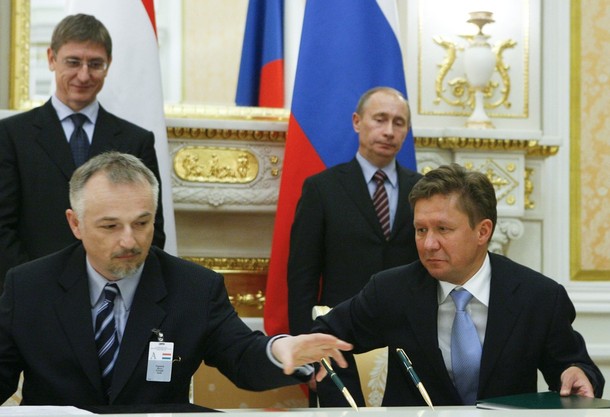
Surgut’s Move Against MOL: A New Stage in Russian Acquisition Strategy in Europe
Publication: Eurasia Daily Monitor Volume: 6 Issue: 65
By:

Russian expansion into European energy industries stands poised to cross a new threshold with the stealthy acquisition of a large stake in Hungary’s privately owned MOL by Russia’s Kremlin-controlled Surgut Neftegaz (EDM, April 2,). This move entails a number of bold novelties.
First, Surgut’s lack of transparency is deep even by Russian standards, with its ownership structure largely undisclosed. Second, this oil company is seen as linked with Prime Minister Vladimir Putin, who is rumored to be a major shareholder directly or indirectly in Surgut. Thirdly, European collaborators have been enlisted to hand over that stake in MOL practically overnight to Surgut, behind the back of EU member countries and EU regulatory authorities, and ignoring the energy-security implications of this move. And, fourthly, the cash-rich Surgut may be acting as a half-way house for larger, but currently cash-strapped Russian companies, who may repurchase this MOL stake from Surgut at a later stage.
Austria’s OMV Oil and Gas Company, smarting after the defeat of its hostile takeover attempt against MOL in 2008, sold its entire 21.2 stake in MOL to Surgut, according to parallel announcements by OMV and Surgut on March 30. The move, turning Surgut into MOL’s single largest shareholder, seems to have been precipitated by some unknown interests, adding to the murkiness of this affair. As recently as March 23, OMV’s CEO Wolfgang Ruttenstorfer was quoted in an interview with the Vienna weekly Profil claiming that OMV would probably sell its stake in MOL eventually, but "we do not currently plan to sell the shares. This does not mean that we would never do it, but this year we will indeed keep them" (Profil cited by Reuters, March 23). If those words were true on that date -and there is little reason to doubt them- some major factor must have intervened within days to designate Surgut as the buyer and trigger OMV’s deal with this company.
According to MOL’s chairman and CEO, Zsolt Hernadi, the 1.4 billion Euros paid by Surgut to OMV covers precisely OMV’s costs of purchasing and holding those MOL shares during the last two years. This equivalence seems to confirm the earlier suppositions that OMV had fronted for Russian interests in 2007-2008 during OMV’s hostile takeover attempt against MOL, Hernadi testified in the Hungarian parliament’s emergency hearing on this issue (MTI, April 1; Magyar Hirlap, April 2).
If Hungarian and EU regulators approve this sale, Surgut will almost certainly try to increase its stake in MOL further, preparatory to a takeover attempt. As Hernadi noted during the parliamentary hearing, Russian oil companies acquiring refineries in Central and Eastern Europe generally aim for full ownership or outright majority stakes (Magyar Hirlap, April 2). Thus, Surgut’s recently acquired stake -already the single largest in MOL- could be only the first step toward a takeover attempt.
Once allowed inside the Hungarian company, Surgut would be in a stronger position to prepare and mount a takeover. With its cash reserves estimated at $20 billion (thanks to having minimized investment and borrowing in recent years), Surgut can easily overpay to acquire additional MOL shares, just as it paid double the market value for the stake it just bought. It can also tempt some in Hungary with promises to help recapitalize the energy sector from Surgut’s cash hoard during the ongoing financial and economic crisis. Surgut also can resort to Putin’s political and foreign-policy muscle in promoting further expansion. With its two-pronged expansion strategy in the oil and gas sectors, Russia can use its near-monopoly on gas supplies to influence decisions of a gas-dependent country such as Hungary.
Should it come to a takeover battle, the Hungarian side would have to take into account MOL’s own dependence on Russian crude oil supplies through the Druzhba pipeline. The Russians repeatedly cut off crude oil supplies through the Druzhba system to EU member countries. Moscow terminated the supplies to Latvia in 2004 and to Lithuania in 2006; and reduced supplies temporarily to Germany and several Central European countries in 2007, to Germany again in 2007 and 2008, and to the Czech Republic in 2008. This instrument could be used again if Surgut starts a takeover battle from within MOL. But the same Russian instrument would be far less effective if Surgut’s purchase is blocked in accordance with legal and regulatory statutes. In that case, any manipulations with Russian oil deliveries would clearly look like political retaliation by Moscow.
In sum, once inside MOL, Surgut would achieve stronger positions from which to pursue a takeover. It would also have the option -as some Russian analysts also suggest- to re-sell its stake later on to another Russian company, such as Lukoil, Rosneft, or Gazpromneft (RossBusinessConsulting, April 2). These are short of liquidity for acquisitions at this time, but they pursue expansion plans in Europe and expect to recover from the present slump.
Due to those factors, it would be risky to try a modus vivendi with Surgut by approving its purchase of the stake in MOL and expecting Surgut in return to give up any ambitions to take over later. Surgut would become more dangerous, once it enters MOL as a shareholder. The less risky course of action would be for the Hungarian government regulators and parliament, as well as for EU regulators, to withhold approval of the sale to a murky company, the shareholder structure of which is, after all, undisclosed to Hungary and Europe.




